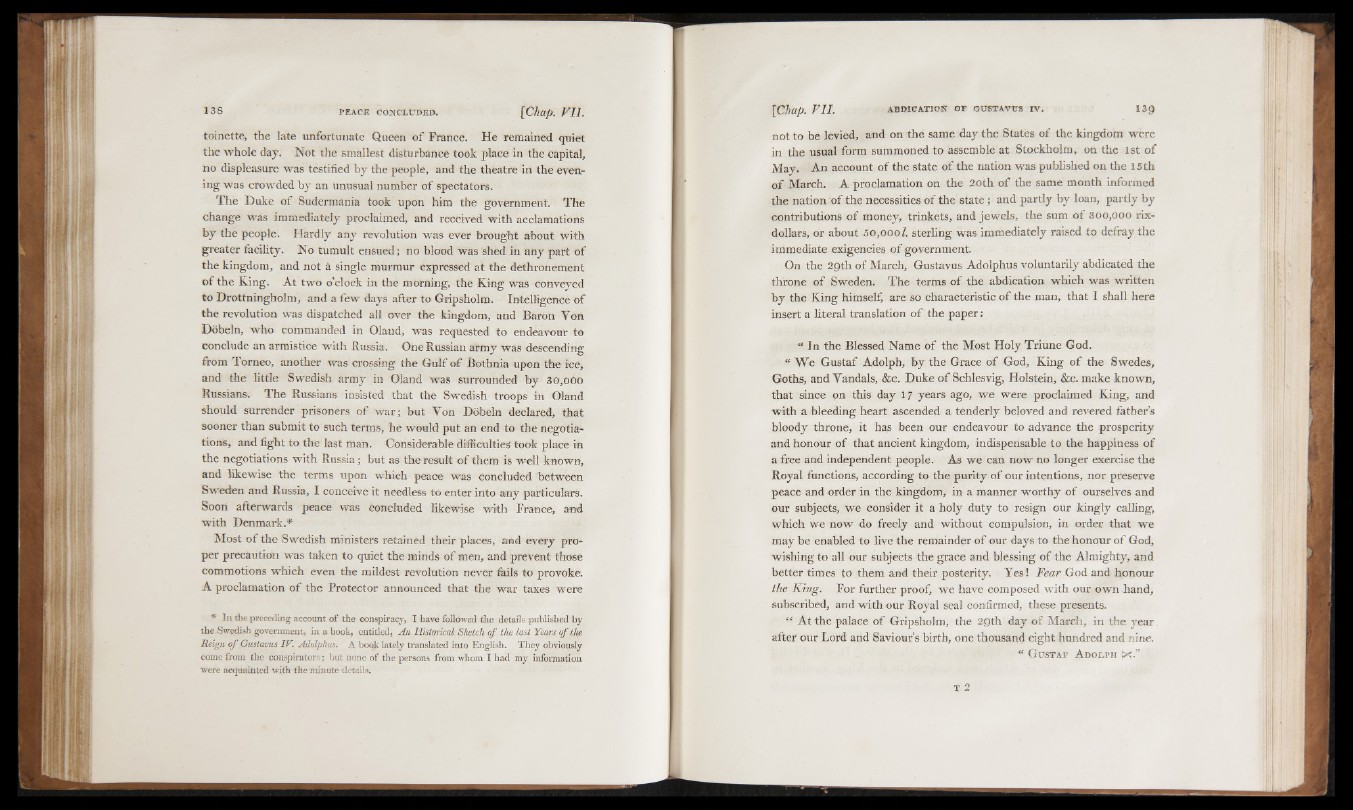
toinette, the late unfortunate Queen of France. He remained quiet
the whole day. Not the smallest disturbance took place in the capital,
no displeasure was testified by the people, and the theatre in the evening
was crowded by an unusual number of spectators.
The Duke of Sudermania took upon him the government. The
change was immediately proclaimed, and received with acclamations
by the people. Hardly any revolution was ever brought about with
greater facility. No tumult ensued; no blood was shed in any part of
the kingdom, and not 4 single murmur expressed at the dethronement
of the King. At two o’clock in the morning, the King was conveyed
to Drottningholm, and a few days after to Gripsholm. Intelligence of
the revolution was dispatched all over the kingdom, and Baron Ton
Dobeln, who commanded in Olaud, was requested to endeavour to
conclude an armistice with Russia. One Russian army was descending
from Tomeo, another was crossing the Gulf o f Bothnia upon the ice,
and the little Swedish army in Oland was surrounded by 30,000
Russians. The Russians insisted that the Swedish troops in Oland
should surrender prisoners of war; but Yon Dobeln declared, that
sooner than submit to such terms, he would put an end to the negotiations,
and fight to the last man. Considerable difficulties took, place in
the negotiations with Russia; but as the result o f them is well known,
and likewise the terms upon which peace was concluded between
Sweden and Russia, I conceive it needless to enter into any particulars.
Soon afterwards peace was concluded likewise with France, and
with Denmark.*
Most of the Swedish ministers retained their places, and every proper
precaution was taken to quiet the minds o f men, and prevent those
commotions which even the mildest revolution never fails to provoke.
A proclamation of the Protector announced that the war taxes were
* In the preceding account of the conspiracy, I have followed the details published bv
the Swedish government, in a book, entitled, A il Historical Sketch o f the last Years o f the
Reign o f fjiLstavus IV.' Adolphus. A book lately translated into English. They obviously
come from the conspirators; but none of the persons from whom I bad my information
were acquainted with the minute details.
not to be levied, and on the same day the States of the kingdom were
in the usual form summoned to assemble at Stockholm, on the 1 st of
May. An account of the state o f the nation was published on the 15 th
of March. A proclamation on the 20th of the same month informed
the nation of the necessities of the state; and partly by loan, partly by
contributions o f money, trinkets, and jewels, the sum o f 300,000 rix-
dollars, or about 50,00ol. sterling was immediately raised to defray the
immediate exigencies o f government.
On the 29th of March, Gustavus Adolphus voluntarily abdicated the
throne o f Sweden. The terms o f the abdication which was written
by the King himself, are so characteristic o f the man, that I shall here
insert a literal translation o f the paper:
“ In the Blessed Name o f the Most Holy Triune God.
“ We Gustaf Adolph, by the Grace o f God, King o f the Swedes,
Goths, and Yandals, &c. Duke o f Schlesvig, Holstein, &c. make known,
that since on this day 17 years ago, we were proclaimed King, and
with a bleeding heart ascended a tenderly beloved and revered fathers
bloody throne, it has been our endeavour to advance the prosperity
and honour of that ancient kingdom, indispensable to the happiness of
a free and independent people. As we can now no longer exercise the
Royal functions, according to the purity o f our intentions, nor preserve
peace and order in the kingdom, in a manner worthy o f ourselves and
our subjects, we consider it a holy duty to resign our kingly calling,
which we now do freely and without compulsion, in order that we
may be enabled to live the remainder of our days to the honour o f God,
wishing to all our subjects the grace and blessing of the Almighty, and
better times to them and their posterity. Y e s ! Fear God and honour
the King. For further proof, we have composed with our own hand,
subscribed, and with our Royal seal confirmed, these presents.
“ A t the palace o f Gripsholm, the 2gth day of March, in the year
after our Lord and Saviour’s birth, one thousand eight hundred and nine.
“ G u s t a f A d o l p h X . ”